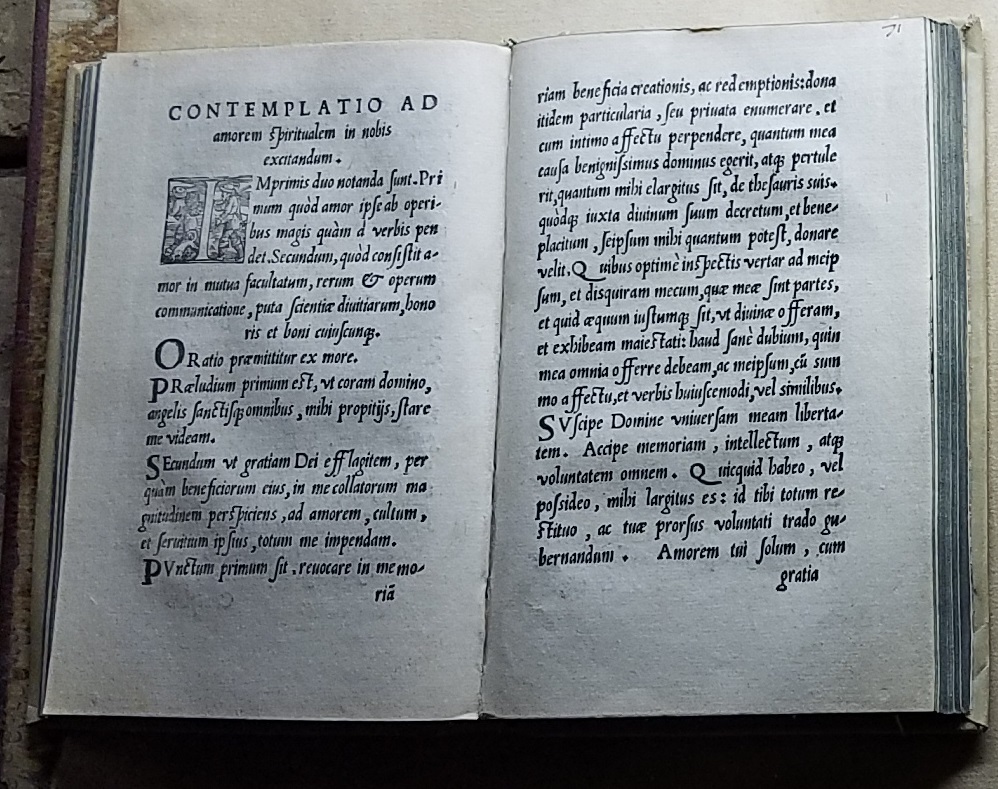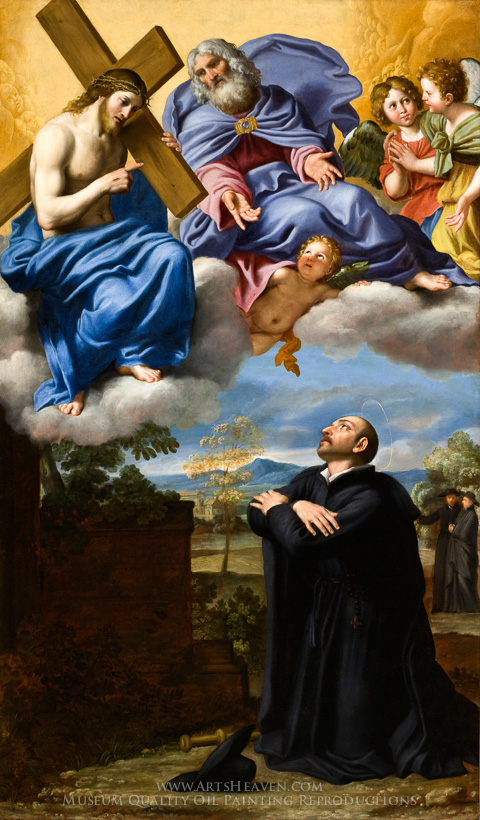
Epilogue: Lessons from the Life of Ignatius
It’s been five hundred years since Ignatius walked the earth, but his influence lives on through the spirituality he created and the schools he helped establish. He’d be surprised to hear that there are more than 2500 Jesuit and Ignatian schools today, serving more than two million people around the world.

He’d be even more surprised to learn that people are reading his biography. The humble Ignatius had no interest in writing a book about his life. The book he wanted people to read was the Spiritual Exercises, which would help them grow in their relationship with God and become better people. But the men closest to Ignatius realized his life experiences were also valuable, and they wanted to share those with others too, hoping his example could have a positive impact on people. So Ignatius reluctantly agreed to tell them his life story, sharing the details he thought were most important.
One of the key lessons Ignatius learned was how to make an important decision. His cannonball injury meant he couldn’t pursue his lifelong dream of a soldier anymore, and he had plenty of time to think about what he wanted to do next. He wanted to do something great, so he spent hours every day reflecting on what was the best course of action. After several months he decided that God was calling him to discard his old life and embrace a new one, leaving behind the life of a knight and following in the footsteps of Christ instead.
The term Ignatius used for making an important decision is “discernment,” and it involves several key steps. The first is to be as impartial as you can. Recognize the biases you have, and try to put them aside so you can make a level-headed decision. For example, pretend you’re deciding on which college you want to go to. Maybe you prefer the university of your home state because that’s where many of your friends are planning to go. That’s not a terrible reason, but it’s not a great one either. If you’re deciding among three different schools, put that reason aside and try to look at all three colleges objectively.
Another important step is to listen to your innermost desires. This one probably sounds surprising, but Ignatius believed that deep down inside, God is speaking to each of us through our feelings. This doesn’t include sudden feelings like excitement about something new or fear of something that’s different than what we’re used to. It’s about the feelings we feel most strongly and that stay with us for a while. Ignatius also encouraged people to use their imagination, just like he did while lying in bed recovering from his injury. Imagine what life would be like if you chose this option and ponder that for a while. Then imagine what life would be like if you chose a different option and ponder that for a while. Ignatius did this when thinking about returning to the life of a knight or imitating the holy deeds of St. Francis and St. Dominic. If you’re thinking about which college to go to, imagine what your life would be like if you chose a certain school and where that path would lead you. Spend some time imagining what that life is like, and then do the same for another school you’re considering.
After you’ve done this imagining and reflecting on your innermost desires, think about how you feel afterward. When you imagine attending a certain school, does that place feel most authentic to you, and do you feel at peace with that decision, like this is the right fit for you and your future? Or do you feel perhaps some excitement but not a lasting peace, and it leaves you feeling empty or unfulfilled after a while? Ignatius experienced these feelings for months, and he called the first one “consolation” and the other “desolation.” After reflecting on these feelings for a while, it’s best to go with the one that leaves you feeling fulfilled, at peace, and most like yourself.
These feelings are God’s way of communicating to you, but there are other useful tips for discernment as well. One is to make a list of pros and cons and weigh each one carefully as you try to decide. Another is to use your imagination in a different way. Imagine yourself on your death bed, and think about what decision you wished you had made when you were younger. Will the elderly version of yourself be pleased with the college you decided to go to, or will he regret that decision because you went to that school for the wrong reasons? You could also imagine a friend or relative of yours going through the same decision, and think what advice you’d give him or her in that situation. Then give yourself that same advice.

Ignatius had to make many important decisions in his life, and this process of discernment helped him immensely. Another thing that helped Ignatius was realizing that he couldn’t do everything alone but had to rely on the support of others. Ignatius’s life is full of examples of people helping him out when he was in need. There were numerous times when Ignatius became ill and needed others to nurse him back to health. He almost died on the battlefield, but the assistance of his comrades and the French soldiers helped him survive, and his recovery at home was made possible by his family, especially his brother’s wife. Many times after that he needed help, both for his health and for financial support so he could go to Jerusalem, then go to school in Spain and France, then help the poor in Italy, and then establish the Society of Jesus. There were many people to thank in his life, and the same is true for us. We need to remember that what we accomplish is made possible by the people who support us and help us along the way.
Obviously the one who helps us the most is God, and putting God at the center of our lives is another key lesson from the life of Ignatius. He always believed in God, but God was on the periphery of Ignatius’s life when he was young. Fame, glory, and conquest were at the center of his early life. After his recovery Ignatius changed his focus, and he put God at the center from then on. This became one of the key points in his Spiritual Exercises, and he referred to it as the “First Principle and Foundation.” He placed it at the beginning of his book so people would put it first in their minds and let it influence everything they did. It’s written in a way that sounds odd to us today, but it goes something like this. Our purpose in life is to go to heaven and live with God forever. God wants this for us because God loves us immensely, and we should love God in return. In order to do that, we need to be careful not to be distracted by the things in this world that take us away from loving God, and we should seek those things that help us love God more fully. In fact, we should view everything in this world with indifference. I shouldn’t care for wealth, a long life, perfect health, popularity, and so forth, because those things aren’t necessary for loving God. I also shouldn’t care about being poor, living a short life, being sick, being unpopular, and so forth, because these things don’t matter either. They only matter if they help me love God. If being healthy enables me to serve God in some way, then great. But if being injured enables me to serve God better, then that’s what I should want. After all, Ignatius almost lost his legs from a cannonball, which eventually led him to serve God in amazing ways.
Loving God to the fullest should be our guiding principle. We live busy lives and spend much time on various pursuits – getting into a good school, earning good grades, making a sports team, finding a good career. But Ignatius wants us to reflect on why we’re doing these things in the first place. Are they helping us achieve our true purpose, which is to serve God? Or are they helping us serve ourselves instead? We should always pause and take a step back, examining our life to make sure the decisions we make are aimed at loving God. Our sole reason for being on this earth is to go to heaven, so everything we do should be geared toward that goal. Nothing else matters.
This approach is both simple and radical, and it requires us to be reflective at all times. As Socrates once said, “An unexamined life is not worth living.” But Ignatius didn’t want people to spend all their time in prayer and reflection. We need to be active in the world in order to make it a better place. This combination of reflection and action is best summed up in the expression “contemplative in action.” A good person is someone who devotes time to contemplation but also to doing good deeds. Both are important, and we shouldn’t neglect one in favor of the other. If we’re constantly working, we could easily burn out, and we might even be doing things the wrong way. We need to take a step back, pray to God, and reflect on how we’re living our lives. Similarly if we’re constantly praying and reflecting, we’re not spending enough time loving other people by doing good deeds for them. Prayer and reflection help rejuvenate us and strengthen our relationship with God, but they can lose their impact if we’re not actively loving others.

Loving others was something Ignatius became good at, but it took a lot of practice. The first step was getting injured on the battlefield. Prior to Pamplona he had been living out his own dreams and pursuing things that gave him pleasure, like gambling, womanizing, and fighting. But these left him feeling empty inside since they didn’t bring about true happiness. Months of lying in bed with broken legs helped him see this, and months in a cave in Manresa helped him see what he could do with his life if he put God first and lived his life for others. When Ignatius looked back on his life, he realized his daydreaming wasn’t the problem. It was that he was dreaming about the wrong things. Like Ignatius, we can achieve great things too. We just have to make sure our dreams are the right ones.
